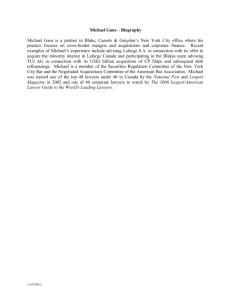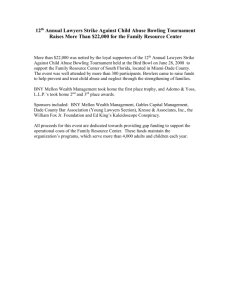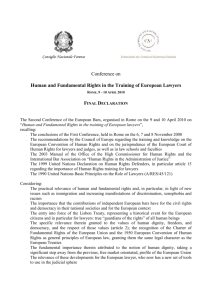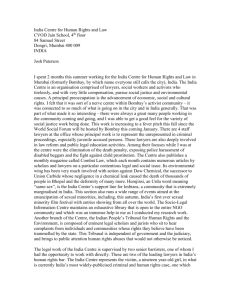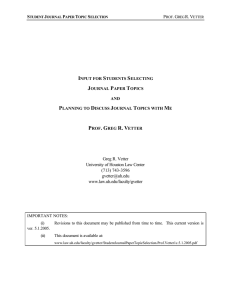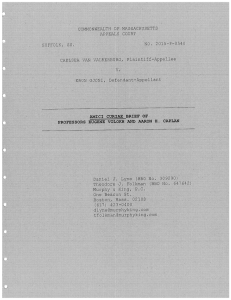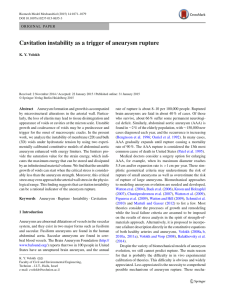Eugene Volokh, Founder of The Volokh Conspiracy
advertisement
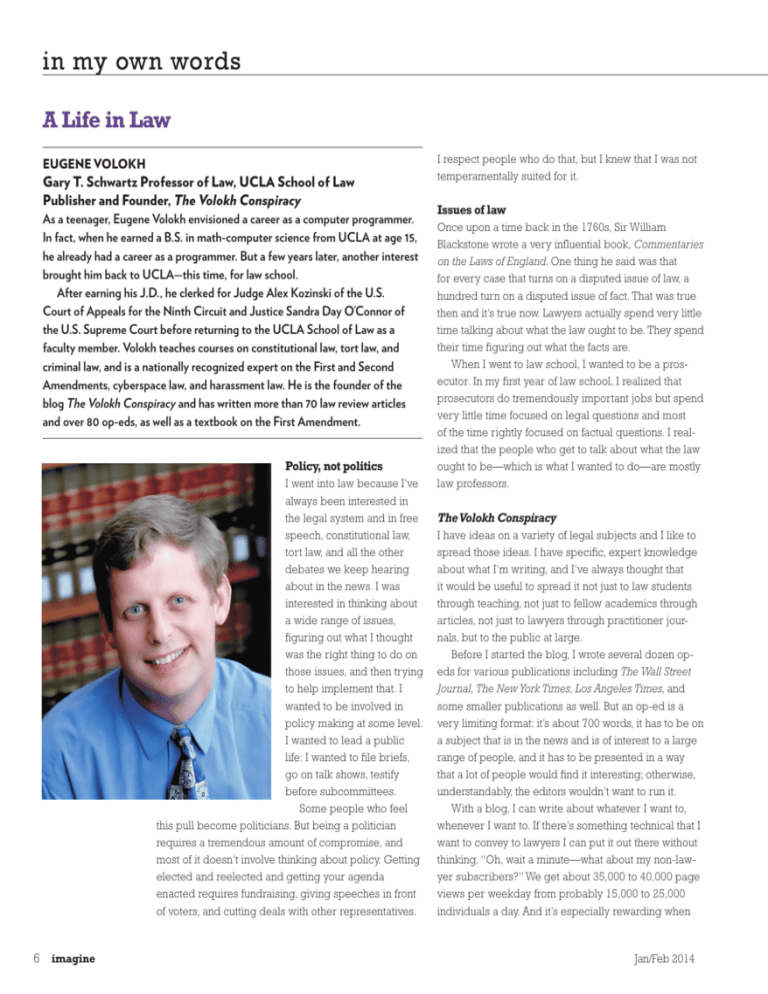
in my own words A Life in Law EUGENE VOLOKH Gary T. Schwartz Professor of Law, UCLA School of Law Publisher and Founder, The Volokh Conspiracy As a teenager, Eugene Volokh envisioned a career as a computer programmer. In fact, when he earned a B.S. in math-computer science from UCLA at age 15, he already had a career as a programmer. But a few years later, another interest brought him back to UCLA—this time, for law school. After earning his J.D., he clerked for Judge Alex Kozinski of the U.S. Court of Appeals for the Ninth Circuit and Justice Sandra Day O’Connor of the U.S. Supreme Court before returning to the UCLA School of Law as a faculty member. Volokh teaches courses on constitutional law, tort law, and criminal law, and is a nationally recognized expert on the First and Second Amendments, cyberspace law, and harassment law. He is the founder of the blog The Volokh Conspiracy and has written more than 70 law review articles and over 80 op-eds, as well as a textbook on the First Amendment. Policy, not politics I went into law because I’ve always been interested in the legal system and in free speech, constitutional law, tort law, and all the other debates we keep hearing about in the news. I was interested in thinking about a wide range of issues, figuring out what I thought was the right thing to do on those issues, and then trying to help implement that. I wanted to be involved in policy making at some level. I wanted to lead a public life: I wanted to file briefs, go on talk shows, testify before subcommittees. Some people who feel this pull become politicians. But being a politician requires a tremendous amount of compromise, and most of it doesn’t involve thinking about policy. Getting elected and reelected and getting your agenda enacted requires fundraising, giving speeches in front of voters, and cutting deals with other representatives. 6 imagine I respect people who do that, but I knew that I was not temperamentally suited for it. Issues of law Once upon a time back in the 1760s, Sir William Blackstone wrote a very influential book, Commentaries on the Laws of England. One thing he said was that for every case that turns on a disputed issue of law, a hundred turn on a disputed issue of fact. That was true then and it’s true now. Lawyers actually spend very little time talking about what the law ought to be. They spend their time figuring out what the facts are. When I went to law school, I wanted to be a prosecutor. In my first year of law school, I realized that prosecutors do tremendously important jobs but spend very little time focused on legal questions and most of the time rightly focused on factual questions. I realized that the people who get to talk about what the law ought to be—which is what I wanted to do—are mostly law professors. The Volokh Conspiracy I have ideas on a variety of legal subjects and I like to spread those ideas. I have specific, expert knowledge about what I’m writing, and I’ve always thought that it would be useful to spread it not just to law students through teaching, not just to fellow academics through articles, not just to lawyers through practitioner journals, but to the public at large. Before I started the blog, I wrote several dozen opeds for various publications including The Wall Street Journal, The New York Times, Los Angeles Times, and some smaller publications as well. But an op-ed is a very limiting format: it’s about 700 words, it has to be on a subject that is in the news and is of interest to a large range of people, and it has to be presented in a way that a lot of people would find it interesting; otherwise, understandably, the editors wouldn’t want to run it. With a blog, I can write about whatever I want to, whenever I want to. If there’s something technical that I want to convey to lawyers I can put it out there without thinking, “Oh, wait a minute—what about my non-lawyer subscribers?” We get about 35,000 to 40,000 page views per weekday from probably 15,000 to 25,000 individuals a day. And it’s especially rewarding when Jan/Feb 2014 stories from the blog get picked up in the news, and then they get talked about more broadly. Not as seen on TV Most lawyering is very much unlike the law you see on television, which is focused on the dramatic and glamorous aspects of law. Television disproportionately focuses on trials, even though typical lawyers, except for criminal lawyers, spend very little of their time in trial. Most lawyers don’t argue before the Supreme Court; most lawyers don’t even spend a lot of time arguing in court. My wife, for example, has been a lawyer for 18 years and has never been in a trial. She has helped resolve lots of cases. She’s helped lots of clients and she’s K OC done a lot of good, but it has been a not IST very glamorous sort of good if your expectation is what you see on the latest law show. Open to change For me, law is a second career. When I was in high school, I thought I would be a computer programmer all my life. I love computer programming. But I changed my area of professional interest, and I think people should be open to doing that. If you go to college and then work a few years, you might find that there are things you love that you never expected to love. So don’t focus too much now on “How can I prepare myself better for my law school application?” That’s many years from now. Be open to lots of things. Think, write My math and computer background is very helpful to me in law. A lot of law is logical and systematic thinking: you begin at the beginning, you go through all the things you need to go through, and you figure out how the rules apply, how they interact with each other. I think this way of thinking gives science, engineering, and math people an advantage going into law. But they have a disadvantage in that they tend not to be very good writers. Anything you can do to improve your writing skills will be useful to you if you want to become a lawyer— and even if you don’t. Technical writing is tremendously important. If you go into business, you’re going to have to write summaries and proposals. If you become a scientist, you need to write grant applications. Good writing skills are always useful. Worth the risk These days there are fewer jobs for lawyers than there used to be some years ago. Law school graduates are having more trouble finding jobs. In that respect, law is becoming like many other businesses. It used to be that you’d graduate from law school and often you’d have a job already lined up. Now it’s dicier, especially if you’re not at the top of your class and if you’re not in a top school. Job security isn’t what it used to be. But life is risk; professional life is risk. The question I think you need to ask yourself is, Is this something you’re going to enjoy doing? If you think law is something you’re going to enjoy—based on what it’s really like and not what it’s like on television—by all means try it. It’s still a very good profession, a very rewarding profession. Intellectual freedom Being a law professor—and being a professor generally—is unusual. First, you can express your actual views rather than a client’s views or somebody else’s views; in fact, it is your duty to express your views. Second, you can express your views on pretty much any subject you choose to focus on. That’s a very rare sort of freedom in a job. I’m very happy doing what I’m doing. I’ll probably be a law professor the rest of my life. Read more about Eugene Volokh at www.law.ucla.edu/volokh. www.cty.jhu.edu/imagine imagine 7



